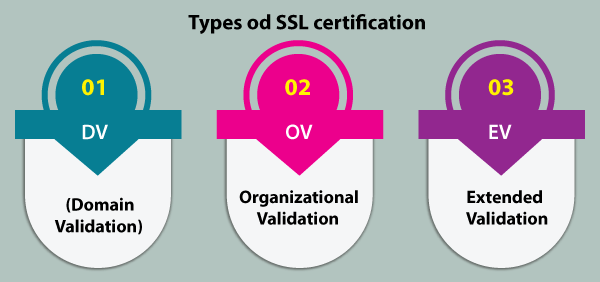Types of SSL CertificatesSSL certificates can be categorized into three main types, which are listed below: 
The levels of encryption are similar for all the certificates. The difference is the verification and vetting processes required for obtaining the certificate. Dramatically, the number of companies has increased using SSL certificates. Also, various applications used for SSL certificates have expanded. For example:
We are able to hide communications from hackers, but we can't stop them from blocking communications. As people decrease their shopping from mortar and brick stores and increase banking habits and online shopping. Consumers must be able to trust a true website of any store they're shopping on. It is more challenging to explain online. We can prove our identity by including an outer third-party (such as GlobalSign) to vet our company and personal information. SSL certificates could be categorized into three important categories on the basis of the vetting and verification procedure. DV SSL (Domain Validation)The CA inspects the applicant's rights for using the particular name of a domain. No identity information of a company is vetted and no data is shown other than the encryption data in the Secure Site Seal (SSS). We can be ensured that our data is encrypted, but we can't be ensured who is actually at that data's receiving end. Domain Validation certificate is completely supported and distributes a similar browser perception with Organizational Validation certificates. It provides the benefit of being expressed immediately and without any requirement for submitting enterprise paperwork. It makes Domain Validation certificates more ideal for trades quickly needing a lesser cost SSL and without any effort to submit enterprise documents. OV SSL (Organizational Validation)The CA inspects the applicant's rights for using a particular name of the domain. Also, it conducts a few vetting of an enterprise. Additional vetted organization data is shown to customers if click on Secure Site Seal (SSS). It is providing increased visibility in the associated trust beyond the site. Also, the name of the organization represents within the certificate upon an ON field. EV SSL (Extended validation)The CA inspects the applicant's rights for using a particular name of the domain with the Extended Validation certificates. Also, it conducts an organization's thorough vetting. The Extended Validation certificate's issuance process is defined inside the guidelines of EV strictly, as ratified via the browser forum/CA in 2007 formally. Every step is needed for any CA before publishing the certificate. Some of the steps are discussed as follows:
The most significant and latest improvement in the technology of SSL since its starting inception pursues the standardized guidelines of Extended Validation. Various new high protection browsers like iPhone Safari 3.0+, Apple Safari 3.2+, Google Chrome, Firefox 3+, Opera 9.5+, and Microsoft Internet Explorer 7+ recognize EV certificates and stimulate the interface security improvement of the browser. It is one of an ideal solution for those who want to proclaim authenticity's highest levels. Each type of business is able to use EV SSL certificates, including unincorporated, incorporated businesses, and government entities. The guidelines of EV audit, the guideline's second set, define the principle under which any CA requires to be audited before publishing EV SSL successfully. Yearly, the audits are regularly for ensuring the issuance process's integrity.
Next TopicWhat are SCM tools
|
 For Videos Join Our Youtube Channel: Join Now
For Videos Join Our Youtube Channel: Join Now
Feedback
- Send your Feedback to [email protected]
Help Others, Please Share









